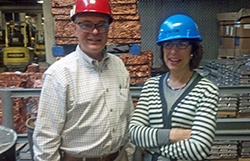Excerpt from The Hitachi Foundation blog. The Hitachi Foundation is partnering with the W.K. Kellogg Foundation, the Illinois Manufacturing Excellence Center (IMEC), and several local funders through the Chicagoland Workforce Funders Alliance to launch a new initiative aimed at growing the number of high-quality manufacturing jobs in the Chicago region.
From Scrap Metal to Precious Metal: Chicago's SIPI Metals Creates Great Products and Great Jobs
 Chicago has been at the epicenter of American manufacturing throughout the 20th century. Today 3,700 firms account for more than 100,000 jobs and over $30 billion in annual sales. Despite its endurance, the Chicagoland manufacturing sector faces challenges - securing a skilled workforce, adapting to new technologies, and bringing innovative products to market. To strengthen its position for the future, the region will need to build on lessons from what works among exemplary firms like SIPI Metals Corporation.
Chicago has been at the epicenter of American manufacturing throughout the 20th century. Today 3,700 firms account for more than 100,000 jobs and over $30 billion in annual sales. Despite its endurance, the Chicagoland manufacturing sector faces challenges - securing a skilled workforce, adapting to new technologies, and bringing innovative products to market. To strengthen its position for the future, the region will need to build on lessons from what works among exemplary firms like SIPI Metals Corporation.
SIPI Metals, recovering and refining scrap metals since 1905, is just one example of a firm in Chicagoland whose profitability hinges on investing in people. In manufacturing, the variability in cost of materials and fluctuations in customer demand mean that companies like SIPI must be agile and adaptable. Recently, Hitachi Foundation CEO Barbara Dyer and VP of Program Mark Popovich visited SIPI Metals to get a closer look.
SIPI's 200K square foot plant, located close to Chicago's Loop, runs production around-the-clock; achieving impressive output and competitive advantage with annual sales at approximately $300 million. Our host, George Phillips - Senior VP for Regulatory Affairs and Human Resources - introduced an operation that entails metals recovery through processing, melting in massive furnaces, chemical analyses in laboratories, and the production of ingots (blocks of metal) to customers' precise specifications.
 SIPI Metals employs 155 people – with 90 unionized workers in production and 10 unionized workers in maintenance. The company has had decades of productive engagement with the United Auto Workers union addressing work rules, wages, benefits, and other contract provisions. Another 15 employees run the chemical laboratories. These laboratories house a number of high-tech machines valued at over $500K, necessitating 24 security officers to provide around-the-clock services. The rest of the employees are spread across supervision, administration, accounting, and management functions.
SIPI Metals employs 155 people – with 90 unionized workers in production and 10 unionized workers in maintenance. The company has had decades of productive engagement with the United Auto Workers union addressing work rules, wages, benefits, and other contract provisions. Another 15 employees run the chemical laboratories. These laboratories house a number of high-tech machines valued at over $500K, necessitating 24 security officers to provide around-the-clock services. The rest of the employees are spread across supervision, administration, accounting, and management functions.
Offering Good Jobs, but Facing Challenges
Strong Pay and Incentives: At SIPI Metals, production work begins at $15/hour and with pay incentives; wages can increase to $20/hour or more than $40,000 annually with overtime or shift premiums.
Low to No Turnover: More than 2/3rds of employees have been with the company for ten or more years – half with tenure 20 years. After the initial probationary period, there is almost no turnover.
Open Book Management: The firm regularly shares details of its operations with workers and engages them in meetings and other efforts to boost their knowledge of the business model and performance against goals.
Employee Ownership: When the founding families exited SIPI Metals many decades ago, the company entered into a long phase of ownership by the nonunion component of the workforce. While there are key personnel with larger stakes in the company, a considerable share of company stock is spread across a sizable group of employees.
Cross-Trained Workforce: Through on-the-job training, most production floor employees have become expert in multiple tasks and machinery. Cross-training reduces bottlenecks - facilitating efficiency and timely production.
Securing a Skilled Workforce: George Phillips identified a challenge faced by the company - maintaining a skilled workforce. He noted this particularly for positions where welding and/or electrician skills are required.
Developing Future Leadership: The experience and durability of the company's leadership has been a key asset. Many senior leaders in the company are at or nearing retirement and replacements are to be developed both from within and through recruitment. Making this transition successful is critical to the company's future.
A Long-View
Mr. Silverstein and Mr. Pinsof started their scrap metal business in 1905 with a horse and buggy on Chicago's west-side. For more than a century, SIPI Metals Corporation has evolved and endured despite the economy's steep ups and downs. As ownership has shifted and times have changed, their commitment to the long-term remains unalloyed. As we were getting ready to head out from our visit, our host George Phillips nailed it when he said: "I've hired everyone here. I know their families. I want these jobs to be here for their children and their children's children." A rare and precious form of metal in our present business culture.
Please contact the Hitachi Foundation or David Boulay, President of IMEC, for more information.




